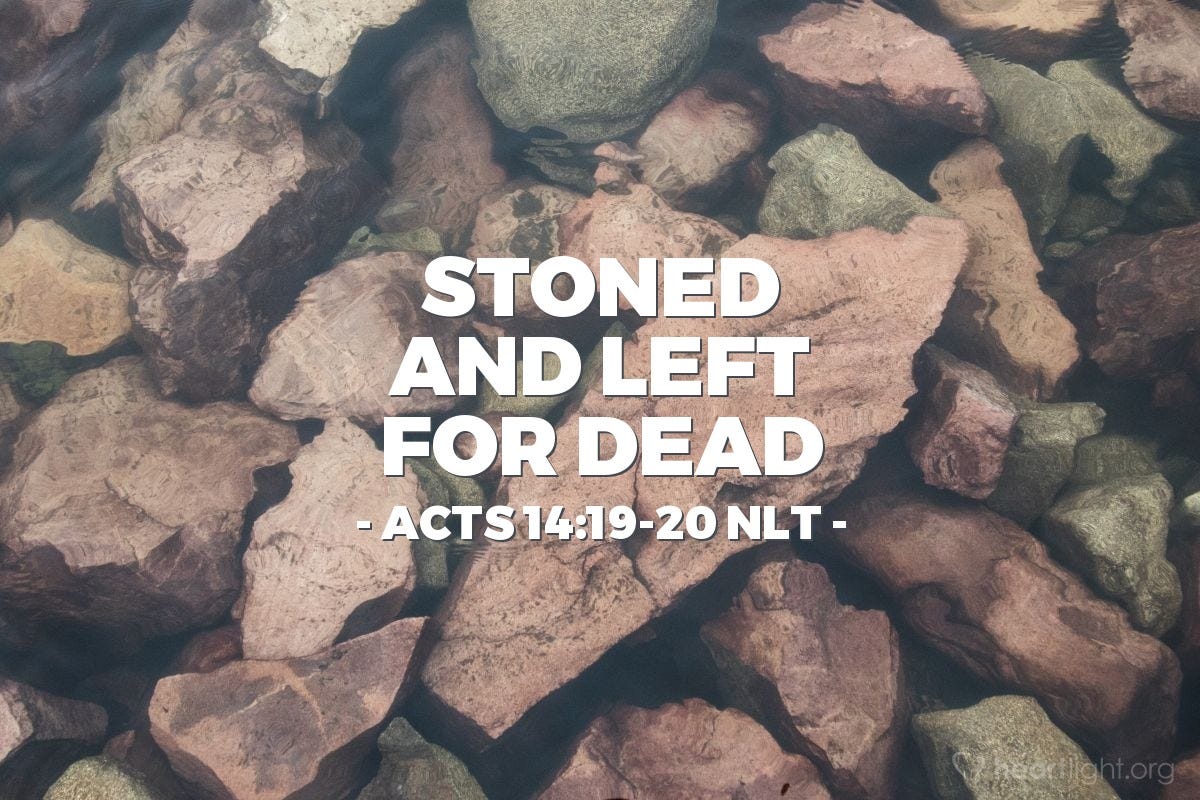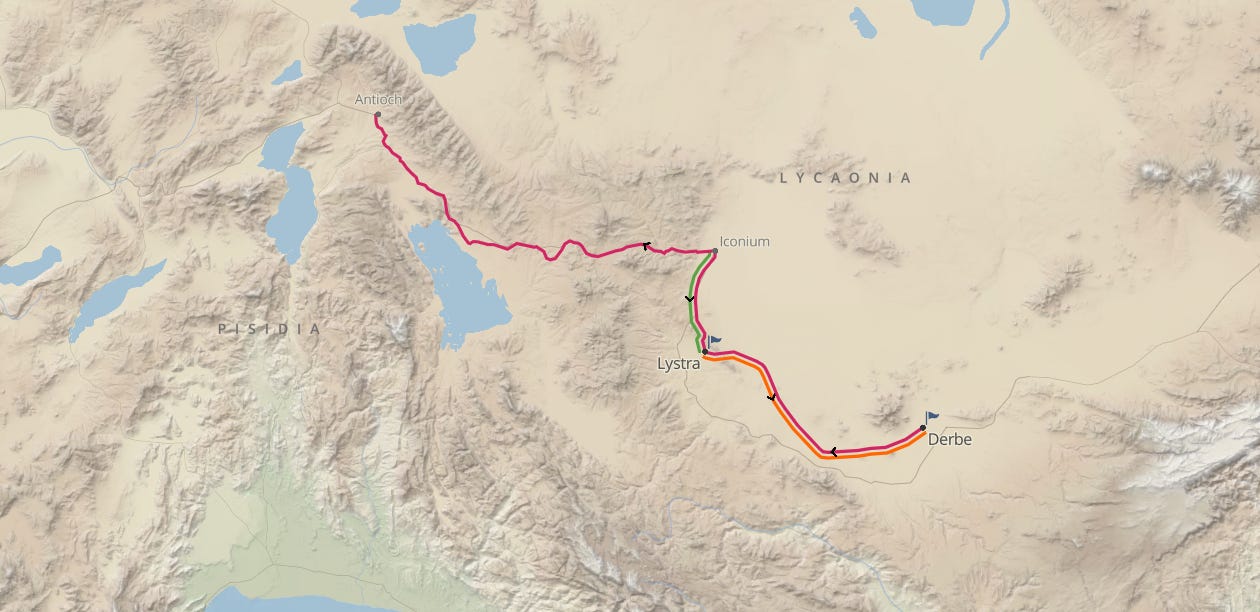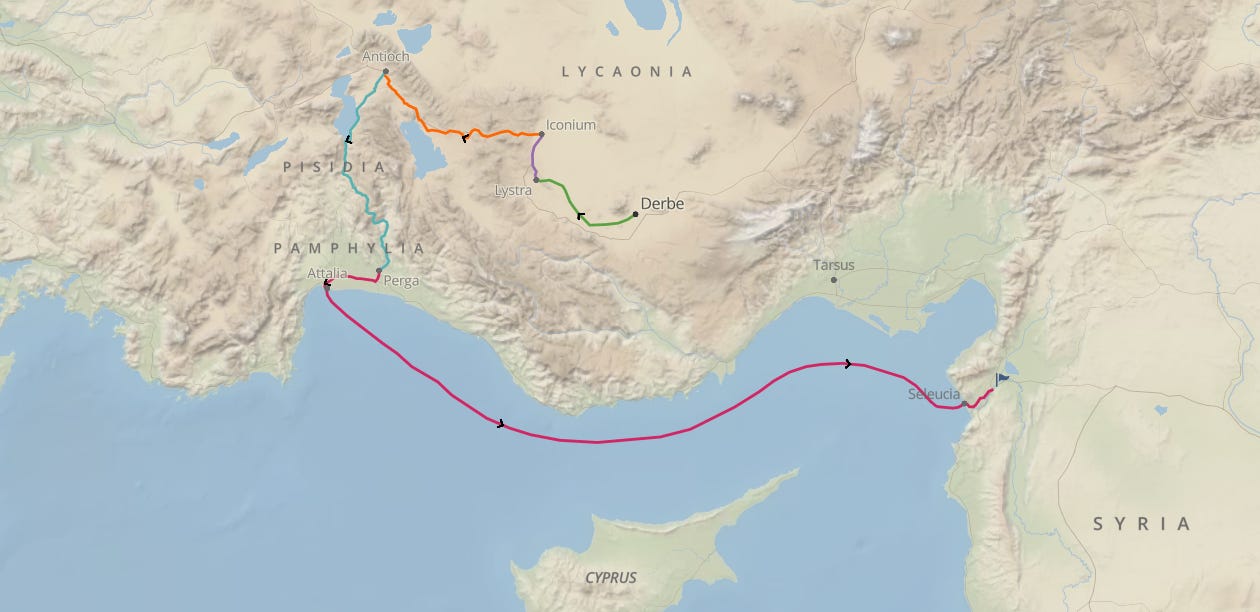A Study of Acts: The Stoning of Paul, Strengthening Believers, Return to Antioch
Acts 14:19-28 - What will stop you from sharing the Good News and doing God’s will?
“But Jews came from Antioch and Iconium, and having won over the crowds, they stoned Paul and dragged him out of the city, supposing him to be dead. But while the disciples stood around him, he got up and entered the city.
The next day he went away with Barnabas to Derbe. After they had preached the gospel to that city and had made many disciples, they returned to Lystra and to Iconium and to Antioch, strengthening the souls of the disciples, encouraging them to continue in the faith, and saying, “Through many tribulations we must enter the kingdom of God.” When they had appointed elders for them in every church, having prayed with fasting, they commended them to the Lord in whom they had believed.
They passed through Pisidia and came into Pamphylia. When they had spoken the word in Perga, they went down to Attalia. From there they sailed to Antioch, from which they had been commended to the grace of God for the work that they had accomplished. When they had arrived and gathered the church together, they began to report all things that God had done with them and how He had opened a door of faith to the Gentiles. And they spent a long time with the disciples.”
Acts 14:19-28 NASB1995
Have you ever noticed that those who are opposed to Christian belief seem much more energized than many who believe? The Jews from [Pisidian] Antioch and Iconium traveled to Lystra in pursuit of Paul and Barnabas. It was approximately 100 miles from [Pisidian] Antioch to this town, so this was no spontaneous rush into action over a short distance. They were intent on stopping the missionaries.
When I was wandering in the wilderness of “secular humanism”, I can say without hesitation that many of the groups that I belonged to that promoted a world without God were relentless in their propaganda and proselytizing (not to mention their judicial activism), just like these Jews who refused to listen to Paul and Barnabas and pursued them for miles and miles. Just ask Christian cake maker Jack Philips from Colorado about the tireless prosecution of him in the courts for over a decade because he stayed true to his faith. Now that I’m back in the fold (thanks to the Lord), I confess to being cowardly sometimes when it comes to defending my faith or sharing it (as opposed to my zeal and overbearing attitude when I had a lack of faith).
The entourage of Jews arrives in Lystra and they are able to turn the people against Paul and Barnabas. These are the same folks who, a short time earlier, wanted to worship the disciples as gods. People are so fickle and can turn on a dime and go from an adoring crowd to a brutal mob. Paul is stoned and dragged out of town, presumed to be dead. Now think about this for a second: The Jews, who normally want nothing whatsoever to do with any Gentiles or especially Gentile pagans, align with these people to target Paul and Barnabas. As I read in some commentary, the enemy of my enemy is my friend. But while the disciples were gathered around Paul, he got up and entered the city!
Here is some good commentary from Enduring Word:
Then Jews from Antioch and Iconium came: These opponents were not content to kick Paul out of their own region (Acts 14:5-6); they followed him and brought their persecution with them.
Some of these persecuting Jews from Antioch and Iconium traveled more than one hundred miles just to make Paul miserable. They were dedicated adversaries of Paul.
Having persuaded the multitudes: They incited the people of Lystra against Paul and Barnabas, and instigated the stoning of Paul. This was obviously an attempt to execute Paul and Barnabas – with the rocks being thrown by the same people who wanted to worship them shortly before.
This is a dramatic demonstration of how fickle a crowd can be. Their admiration of the miracle and desire to honor Paul and Barnabas as gods did not last long.
It is dangerous for any spiritual leader to cultivate or allow a kind of hero-worship. The same people who give this honor will feel terribly betrayed when the leader is shown to be human.
They stoned Paul and dragged him out of the city, supposing him to be dead. However, when the disciples gathered around him, he rose up and went into the city: Paul was miraculously preserved here. Some think that he was even actually killed and raised to life again, because stoning was usually reliable form of execution.
When Paul later wrote, I bear in my body the marks of Jesus (Galatians 6:17), he may have had in mind the scars from this incident. He certainly later referred to this stoning in 2 Corinthians 11:25.
It has been suggested that the heavenly vision described by Paul in 2 Corinthians 12 took place at this attack. This is possible, but only conjecture.
It’s reasonable to think that Paul remembered Stephen when he was being stoned, and how he had been a part of Stephen’s execution (Acts 7:58-8:1).
He rose up and went into the city: When Paul was revived, he did not flee the city that stoned him. Instead he immediately went back into it. He had been driven out of Antioch and Iconium by this traveling mob, and he was determined to leave Lystra on his own terms.
In Acts 16:1, we learn of a young Christian in Lystra and his mother – Timothy. Perhaps Timothy saw all this and was inspired to the high call of the gospel by noticing Paul’s courage and power in ministry.
Some key takeaways from this commentary:
Without their understanding of the beauty and depth of the Gospel story, the people of Lystra are persuaded almost instantly to try and destroy those that they admired just a few minutes before. It’s just like the people at the trial of Jesus - they were proclaiming Him and shouting “Hosanna” a few days earlier as He entered Jerusalem, but flipped to a posture of deep hatred calling for His death and the release of Barnabas. Psychological traits like “group think” and peer pressure are very powerful in crowds.
It is quite possible that this was a true miracle, as stoning was quite injurious and usually resulted in death for the victim.
Paul carried the scars from this event (and many more in his life) as evidence of his devotion to Christ. Now that he was on the receiving end of this brutal execution method, I agree that he likely gave some thought about what happened to Stephen.
Paul returns to the scene of the crime in the town. He is not deterred from trying to save souls. What do you suppose the reactions would be from the Jews and the people who had just stoned him and dragged him out of town? Perhaps a few were converted!
I did not make the connection to young Timothy perhaps being there when Paul was in Lystra for the first time until reading this commentary. Good can come out of bad!
This map, from Precept Austin, shows the next part of the journey. Paul and Barnabas and the other disciples travel on to the town of Derbe. This town, located about 47 miles southeast of Lystra, shows that there were no lasting effects on Paul from the stoning if he was able to walk that distance. They were successful there in making many disciples. They then return along the same path and through the same towns of Lystra, Iconium and Pisidian Antioch.
The purpose of this return to those dangerous places was to strengthen the disciples that were there, encouraging them to continue in the faith, and reminding them that through “many tribulations we must enter the kingdom of God”. They appointed elders, prayed and fasted, and commended them for their belief. The process of sanctification is not easy; in this life, believers will have troubles! I like this story from Precept Austin that uses the example of making a Steinway piano:
The Most High God is in control of all the adverse and difficult circumstances of our lives. You may be going through an adverse experience as you read these notes. Let's call it, for illustration purposes, a "STEINWAY EXPERIENCE" (read on).
If you had to name the most famous piano, the one that produced the most beautiful sound in the world which one would you name? Most people would say "Steinway". The Steinway piano has been preferred by keyboard masters such as Rachmaninoff, Horowitz, Cliburn, and Liszt and for good reason. It is a skillfully crafted instrument that produces a phenomenal sound. Steinway pianos are built today the same way they were 140 years ago when Henry Steinway started his business. 200 craftsmen and 12,000 parts are required to produce one of these magnificent instruments. Most crucial is the rim-bending process, where 18 layers of maple are bent around an iron press to create the shape of a Steinway grand. Five coats of lacquer are applied and then hand-rubbed to give the piano its outer glow.
The instrument then goes into the "Pounder Room", where each key is pounded 10,000 times to ensure quality and durability. Followers of Jesus Christ, much like the grand Steinway, are being "handcrafted" with all of the steps being watched over and directed by our Most High God, El Elyon, the One Who is in sovereign control of every detail of this process often referred to as (progressive) "sanctification".
We are being pressed and formed and shaped for a divine purpose, that we might "become conformed (molded with an inner and essential and not merely superficial conformity) to the image of His Son" (Ro 8:29-note). We are being polished, sometimes with what seems like excessive "rubbing of affliction", until we "glow." We are then being continually tested in the laboratory of everyday human experience. The process of sanctification is not always pleasant, but we can persevere with hope (absolute assurance of future good), knowing that our lives will increasingly reflect the beauty of holiness to the eternal praise of the Most High God. Amen.
I spent a lot of my life playing the piano, especially in my younger years before Rheumatoid Arthritis damaged some joints in my hands and wrists, so it is my favorite instrument. I admire those who are able to play an instrument like a beautiful Steinway grand piano, turning those keys into the sounds of unforgettable melodies and serious classical works (like the sublime and ridiculously difficult Rachmaninoff’s Third Piano Concerto or triumphant and beautiful Beethoven’s Fifth Piano Concerto). A pianist capable of playing those works with a world-class orchestra doesn’t just sit down and play it flawlessly the first time, but must practice, practice, practice. Our sanctification is similar - we are tested and tested and refined until we are triumphant!
Here’s another map from Precept Austin. Paul and Barnabas (and the other disciples that likely accompanied them) return to Perga and speak the word, then arrive in the port of Attalia, where they find a ship to return to the church in Antioch in Syria. They reported their successes and how God has opened the door to the Gentiles, which they commended to the grace of God. I’ll end this devotional with additional commentary both from Precept Austin (a fabulous story about unmerited grace) and from Enduring Word on the last passage:
Too many of us (yours truly included far too often!) are like the story of the poor European family who saved for years to buy tickets to sail to America. Once at sea, they carefully rationed the cheese and bread they had brought for the journey. After 3 days, the boy complained to his father, “I hate cheese sandwiches. If I don’t eat anything else before we get to America, I’m going to die.” Giving the boy his last nickel, the father told him to go to the ship’s galley and buy an ice-cream cone. When the boy returned a long time later with a wide smile, his worried dad asked, “Where were you?” “In the galley, eating three ice-cream cones and a steak dinner!” “All that for a nickel?” “Oh, no, the food is free,” the boy replied. “It comes with the ticket.” Indeed, Amazing Grace, not cheap, but free, sufficient to save a wretch like me, the first day, and then every day for the rest (pun intended) of my life!
Enduring Word:
They reported all that God had done with them, and that He had opened the door of faith to the Gentiles: Their success with evangelism among the Gentiles, and the blessing of God that it demonstrated, showed that what God did in Antioch was not unique. God wanted to replicate this work all over the world.
“In saying that the missionaries reported these things, Luke has used the verb in the imperfect. This may mean that the report was repeated as the two met with different groups scattered throughout the city. But the word church is in the singular. There may have been a number of groups meeting separately, but there was only one church.” (David J. Williams)
He had opened the door of faith: The trip was a great success, though not without great obstacles: The difficulty of travel itself, the confrontation with Elymas on Cyprus, the quitting of John Mark, being driven out of the cities of Antioch and Iconium, the temptation to receive adoration, and being stoned in Lystra. Yet Paul and Barnabas would not be deterred from the work God had them to do.
It can and should be asked of each follower of Jesus, “What will it take for you to back down from doing God’s will? What kind of temptation or obstacle or opposition will do it?” Nothing stopped Jesus from doing God’s will on our behalf; as we look to Him, we won’t be stopped either.
Paul later expressed this drive in a letter to a congregation: Not that I have already attained, or am already perfected; but I press on, that I may lay hold of that for which Christ Jesus has also laid hold of me. Brethren, I do not count myself to have apprehended; but one thing I do, forgetting those things which are behind and reaching forward to those things which are ahead, I press toward the goal for the prize of the upward call of God in Christ Jesus. (Philippians 3:12-14)
So they stayed there a long time with the disciples: Back at their home church in Syrian Antioch, we can assume that Paul and Barnabas took a long break and found plenty of ministry to do back there.
So, believer, what will it take for you to back down from doing God’s will? I can imagine that Paul and Barnabas talked a little bit about the obstacles, but were more enthusiastic for the successes. We should not be stopped!
My next devotional examines Acts 15:1-5 - The council at Jerusalem.
Heaven on Wheels Daily Prayer:
Dear Lord - Your Amazing Grace is sufficient for me! I pray that I always put You first, in the middle and last in my life and that I am empowered by You to boldly speak and defend Your word. Amen.
Scripture quotations taken from the (NASB®) New American Standard Bible®, Copyright © 1960, 1971, 1977, 1995 by The Lockman Foundation. Used by permission. All rights reserved. lockman.org
Precept Austin was accessed on 11/9/2024 to review commentary and maps for Acts 14:19-28.
Commentary from Enduring Word by David Guzik is used with written permission.







Barb, It was while reading a book on a plane that was all about Saul (Paul), and his life, that I broke down in tears!
The realization, to know all the suffering that Paul did, in every single town on that journey, and he still went back to every single town, tells me today;that when he was on the road to Damascus, he definitely saw and heard from Jesus!
An average person could not stay suffering his whole life to proclaim a message unless they definitely knew the truth in it!🙌🙌🙌